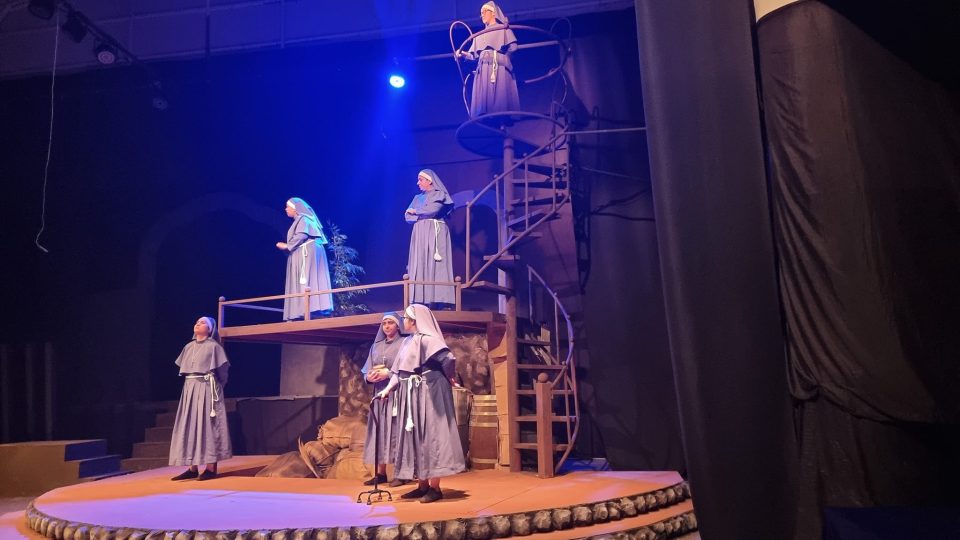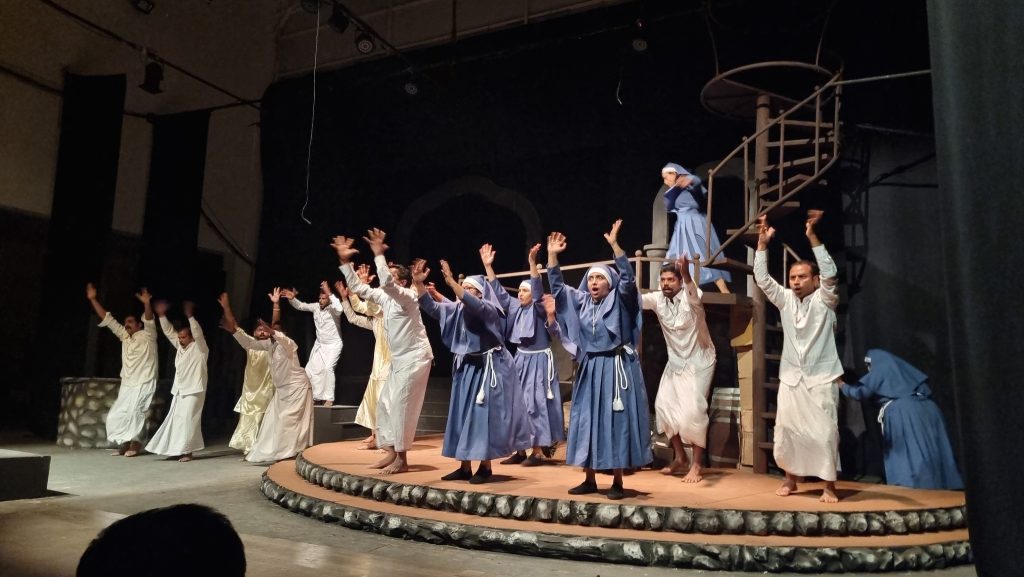
Why Catholic groups in Kerala want ban on Malayalam play ‘Kakkukali’

Neythal Nataka Samgham of Alappuzha in Kerala has staged the play Kakkukali (Hopscotch Game) at around 15 venues across the state over the past one year. Recently, a theatre group based in Abu Dhabi (United Arab Emirates) also mounted it in a competition in Sharjah. The play, written by K B Ajayakumar and directed by Job Madathil, was well-received and had no objection from anywhere up until last month, when it was disqualified from the competition owing to a complaint from a Christian organisation, Catholic Congress.
Based on a critically acclaimed short story of the same name by Francis Noronha, Kakkukali deals with the grim life of a teenage girl, who is forced to enter nunhood in a convent, and fights back to leave its cloistered world behind. The short story and the play use the kakkukali, a rural Kerala version of the hopscotch game, in which children toss potsherd (Kakku) and hop blindfolded through a marked space to retrieve it. The game serves as a metaphor for life wherein you have to hop only through the spaces marked by power centres.
The echoes of real life
Natalia, a girl from a coastal village with an alien Russian name, is the central character of the play. Her father, a fisherman and a comrade, had been killed, leaving her mother to provide for her. With no other options, her mother sends Natalia to a convent to become a nun. Although she is fond of her father’s communist past, she is enticed by the food and better life offered at the convent.
Also read: Karnataka women’s troupe seeks social change through Yakshagana, a theatre form
However, she soon realizes the harsh realities of life behind the four walls of the convent, where she is forced to literally bury her memories of her father and subjected to heavy chores. She is punished even for minor mistakes and subjected to abuse. Eventually, Natalia decides to leave the convent, retrieving her father’s books, discarding her veil. When she rejoins her friends and starts to play Kakku on her own terms, the mother who once sent her off to the convent whole-heartedly welcomes her.

“The play is not against the church or the convent. It’s about any institution where a girl or a woman is denied freedom to live. We know how any institution, be it a monastery or something else, would treat someone who runs away from it. Noronha’s short story is multi-layered. Set in my locality, it has the essence of our day-to-day life. Being the son of a fisherman, I am proud of my culture and dialect. So, I had that connection with the premise of the story,” says Job Madathil, the director of the Kakkukali, elaborating on how he came to helm the play.
Demand to ban the play
The play, produced with the financial assistance of Kerala Sangeetha Nataka Akademi, was first performed by Neythal Nataka Samgham at Punnapra (Alappuzha) in the summer of 2022 at Veloor, Thrissur. After that, the group had the opportunity to showcase their performance at 14 more stages across the state. It was when the Abu Dhabi Sakthi Theatres performed the play as part of the Bharat Murali Memorial (Malayalam) theatre competition that the first voice against it was raised.
Also read: Salem’s Modern Theatres is back in the news, and so is actor Kali Ratnam
The UAE faction of the Catholic Congress objected to the play, citing that it hurt the religious sentiments of the Christian minority and the play was subsequently dropped from the competition, causing a furore among theatre activists. After a couple of months, the same organisation has once again come up with an even stronger opposition to the performance of the play. The activists of Catholic Congress, and Kerala Catholic Youth Movement (KCYM) under the Thrissur archdiocese, staged a demonstration in front of the venue of the Guruvayoor Creative Festival, organised by the Left-ruled municipality, where the play had been staged.
“Kakkukali tries to disparage religion in its entirety, from the beginning to the end, particularly the priests and nuns of Christianity. The play is disrespectful towards the Christian faith and the monastic community, who have made numerous contributions to the development of society,” said advocate Biju Kundukulam, former president and global secretary of the organisation. “Under the guise of freedom of expression, the government machinery is supporting the play, which indicates a covert plan to destroy the church and the monastic community. This is not acceptable,” he added.
The catholic church has already demanded a ban on the play and is also preparing for a legal battle. “We will approach the court to seek a ban on the play, which portrays the entire community in bad light. We have the backing of the catholic church. Throughout history, every such move originated from Thrissur, and we are following that path,” says N P Jackson, the general secretary of the Catholic Congress.
Ministry of hurt sentiments
“We did not expect any of these protests. We are well aware of the content of our play and we are sure that it would not hurt the sentiments of a real believer. Just as it happens in any other controversy, some people with vested interests are trying to create misunderstanding among churchgoers,” K B Ajayakumar, the playwright, told The Federal.
Watch: ITFoK 2023: Kerala offers a big stage for world theatre
Malu R. Das, the actor who brilliantly portrayed the central character Natalia, says the play is not in contravention of anyone’s belief. “Kakkukali is not against the believers or church-goers. On the contrary, it portrays the lives of individuals who are oppressed by the social system and hold on to their faith despite their struggles. As the play suggests, the image of crucified Christ for many may be just a pendant to display, but for those who suffer, it’s the sign of their saviour’ we are with them only,” says Malu.
According to N R Gramaprakash, former registrar of Kerala Kalamandalam, the Catholic Congress’s move to oppose Kakkukali is condemnable. “The play does not contain any criticism against the church. Instead, it portrays the hidden motives behind religious beliefs and the exploitation of women,” Gramaprakash said in a Facebook post. He recounted that many similar plays in the past have faced similar threats and survived, including works by N N Pillai, Ponkunnam Varkey and P M Antony.
In 1986, the church had organised massive protests against P M Antony’s play, Christhuvinte Aaram Thirumurivu (The Sixth Holy Wound of the Christ), which was based on Greek writer Nikos Kazantzakis’s novel, The Last Temptation of Christ, which had led to its ban in the state.
Many theatre activists and Left-leaning organisations, including All India Youth Federation (AIYF) and the CPI(M)-backed Purogamana Kala Sahitya Sangham, are rallying behind the play. The theatre group is preparing for more performances once the university examinations are over. With the Christian organisations gearing up for mass protests against the play, a cultural showdown seems to be on the cards in Kerala.


